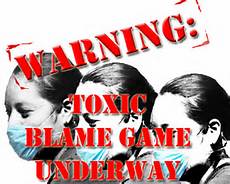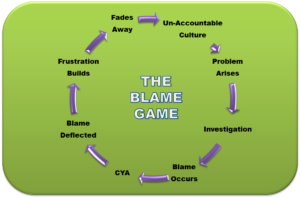How many times have you heard someone who said something that is mean, vindictive and hurtful — or committed a violent and/or destructive act — justify it by saying the recipient had ‘made’ the perpetrator mad?
That’s an example of using blame to excuse your own bad behavior.
Unfortunately, blame is like anger in that it dulls one sense of empathy. It allows a person to act in a hurtful way to another human being. It isn’t the act itself, but it often clears the road. This is a small, but important point. Ordinary humans have inhibitions that serve as a buffer against what we know is bad behavior. Blame is not the act itself, but it either erodes or outright removes these inhibitions, often both . It develops a thought pattern that allows the person’s emotions to override his/her self-control in order to achieve an often selfish end — including sustaining dysfunctional patterns.
While this may seem like an overly harsh statement, also realize the kind of mindset that so quickly adopts blame as a defensive posture for emotional/ego protection is exactly the same one that will put you in front of, otherwise avoidable, physical danger.
Blame Action Loops
It is not uncommon for people who engage in blaming behavior to also engage in selfish behavior. And as long as they are getting benefit from it — whether monetary, emotional, comfort, entertainment or psychological stability — they will continue to engage in those actions. But realize that most of the time the person is too busy doing the behavior to see their actions in this context. Look at the diagram below:
What this illustrates is a simplified action loop model of how humans interact with the world around them. When functioning on this basic level, ‘stimuli’ comes in from the ‘world,’ it is evaluated and an ‘appropriate’ action is taken. An example is you come to a corner with a traffic light. The stimuli coming in is the signal is red and cross traffic is passing. The evaluation is, according to the laws, wait. That’s your action. That keeps you from getting run over. The light turns green, the cross traffic stops and you cross. We do this kind of looping process all the time, adjusting as the results of that action come in.
I believe we are here to learn lessons along our life’s journey. Once we learn a lesson we move on to the next one. However, if we fail to learn a lesson, we keep finding opportunities to learn it again and again.
Isn’t it weird that the woman who can’t leave her old unhappy relationship without starting a new one is always in an unhappy relationship? Or the man who quits his job because he can’t stand his overbearing and ungrateful boss lands a new job with a boss who seems even more overbearing and ungrateful?
Life will continue to throw us the same lessons until we learn from them.
1. Believe there is a lesson to be learned and consent to learn it.
This is probably one of the most important steps. Unless you’re really willing to learn the lesson, even if it feels uncomfortable at times, you can never move forward. Consent to view the situation as something that can help you grow.
2. Admit that you might have helped create the problem.
Warning: This does require you to immediately quit playing the blame game! Just consider the possibility that you somehow contributed to your current situation. This doesn’t mean no one else played a part; it just means perhaps you did, as well.
3. Take some alone time and review the situation.
I’m sure you’ve done this multiple times. It’s time to do it differently. Try to view the situation from a different perspective. Get objective and see it from someone else’s eyes. Is there another way to interpret what happened and how it all played out?
This requires you to be really honest with yourself about your choices and actions. If you’re willing to change your perspective you may immediately see what lesson needs to be learned and exactly how to learn the lesson.
4. Let go of your attachment to the problem.
Trying to control the problem—your boss, your spouse, or your circumstances—will only keep you more attached to it and the more you “leech” onto a problem, the more it “leeches” right back on you.
You will never be able to see the lesson or the solution if you dwell on all the little details about what seems wrong. Letting go could come in many forms: seeing the good in the person who seems difficult, accepting a situation for what it is, or seeing the other side of the story.
Any time we let go of our attachment to what went wrong or what should have happened, we create the possibility of growth—and we pave the path for more positive results.
My personal favorites were step three and four in dealing with my challenges in life. I admitted the role I played, forgave myself, and was finally able to move forward.
Dropping blame allowed me to let go and move on.
Quitting the blame game and learning life lessons has allowed me to be in a loving, equal, and, best of all, relaxing relationship. It’s allowed me to build my dream career. It’s also allowed me to look at each obstacle I’m facing and find something positive to take away from it.
If you’re having an issue then there is a lesson to be learned. Learn the lesson then you get to move forward. That’s how a game should work!


